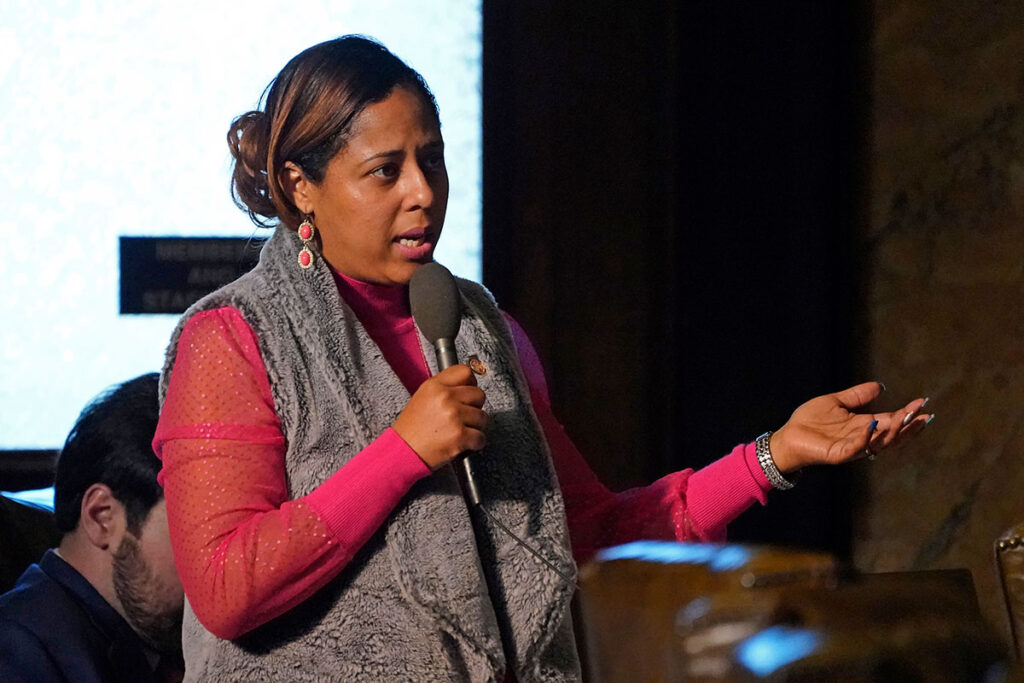Mississippians would have a right to use contraception protected under state law if Democratic lawmakers succeed in getting a proposed bill signed into law during the new legislative session that begins in January 2024.
The Right to Contraception Act is “more than just helping with family planning purposes,” its sponsor, Rep. Zakiya Summers, D, Jackson, told the Mississippi Free Press in an interview on Oct. 27. She said the proposed bill is about “putting the right back into the hands of the people to be able to make the very best health decisions for their lives.”
Because the U.S. Congress has not been able to codify the right to contraception, Summers said she wanted to ensure that Mississippi law protects those rights for residents.
The effort comes a year and a half after the Mississippi attorney general’s office, with the help of a right-wing Christian legal group based in Arizona, paved the way to overturning federal abortion rights and shutting down the state’s only abortion clinic in the 2022 U.S. Supreme Court case Dobbs v. Jackson Women’s Health Organization.
Reeves Skirts Questions About Contraception Ban
Republican Mississippi Gov. Tate Reeves has long been a staunch opponent of abortion and, as lieutenant governor, oversaw the passage of multiple abortion bans—including the one at the center of the Dobbs case. He has not devoted much energy to contraception, though.
In an interview with NBC News Meet The Press host Chuck Todd before in May 2022—over a month before the Dobbs ruling—Reeves avoided directly answering questions about potential contraception bans.
At that time, Republican lawmakers in Louisiana had advanced abortion legislation that would have designated abortions as homicidse and would have criminalized some forms of contraception, like Plan B and IUDs. The bill did not make it to the governor’s desk in the 2022 legislative session, however.
“If there is legislation brought to you to ban contraception, would you sign it?” Todd asked Reeves on the show.
“Well, I don’t think that’s going to happen in Mississippi. I’m sure they’ll have that conversation in other states,” the Mississippi governor replied.
“But you’re not answering the question. Would you sign it?” Todd asked.
“Well, that’s always the case. There’s so many things we could talk about,” Reeves said before changing the subject to talk about the state’s anti-abortion pregnancy resource centers.
After the interview aired, Reeves responded to ensuing criticisms in a series of tweets, saying he was “not interested in banning contraceptives.”
“So now, even though we just had a big flashpoint in the debate over elective abortion, we’re talking about contraception?” the governor tweeted on May 8, 2022.
“Let’s just pause and take a moment to appreciate what the Dobbs case is actually about: returning decision-making on abortion to representatives of the people. There are plenty of distractions out there, but that’s just part of the game. Gotta stay focused on protecting lives,” he continued. Since that time, dozens of Republicans in Congress have advocated for implementing a federal 15-week abortion ban like the Mississippi law at the center of the Dobbs case; some, like Rep. Michael Guest of Mississippi, have even argued for a national ban on abortions after six weeks.

While speaking with the Mississippi Free Press on Oct. 27, Rep. Summers brought up the governor’s May 2022 remarks.
“He was not forthcoming in terms of what he was going to consider around contraception. In fact, he said that he considered tweaking it, doing something with it,” she said.
Regardless of what Republican lawmakers may try to do in the upcoming legislative session, Summers said, she hopes there is enough bipartisan support to pass the Right to Contraception Act.
“I think what we’re doing with this legislation is a proactive approach, so instead of being reactionary to what may or may not happen, we want to be proactive in saying that Mississippians deserve the access, the availability and the right to contraception, and that that right shouldn’t be taken away,” the Jackson lawmaker said.
Summers and her colleagues, including Rep. Chris Bell, have not finished writing the bill, but she said their goal is to use simple, concise language to advocate the right to contraception for Mississippians.
On Nov. 8, 2011, a 58% majority of Mississippi voters rejected the Personhood Amendment, which would have redefined the word “person” in the state’s Constitution to include fertilized human eggs as people, thus banning all abortions.
Some national Republicans, including Mississippi U.S. Sen. Roger Wicker, have since embraced the proposed federal Life at Conception Act; it would define fertilized eggs and fetuses as “persons” under the U.S. Constitution’s 14th Amendment. Like the Personhood Amendment, such a bill could ban contraceptives nationwide if it ever became law.
‘Contraception Is Under Attack’
Americans for Contraception, a nonprofit advocacy organization, is helping push for a right-to-contraception law in Mississippi and other states around the country; the organization is also advocating for a federal law. Organizers formed the group after 195 U.S. House Republicans voted against the Right to Contraception Act in 2022. Co-founder Chris Fleming said Mississippi legislators reached out to the AFC for support for the State’s version of the bill.
“Our whole mission as an organization is to educate and inform the public that contraception is under attack and that everyday Americans need to stand up and protect their freedom to contraception,” he told the Mississippi Free Press on Oct. 27.
Fleming said there is a difference between the “right to contraception” and “access to contraception.” Having the right to contraception means people can legally use it, while having access to contraception means ensuring that people who need contraception can get it, he explained. Fleming added that AFC would also support any efforts to increase access to contraception.
But the proposed Mississippi bill has already drawn opposition from anti-abortion Republicans. In October, Sen. Joey Fillingane, the Sumrall Republican who authored the 2007 trigger law that banned nearly all abortions in the state when it took effect after the Dobbs ruling, warned against the Right to Contraception Act.
“I think this is, again, a very cynical ploy on behalf of very woke Democrats across the country now trying to infiltrate here into Mississippi saying that our very strict law—they’re looking for exceptions, they’re looking for expansions of how to get around it, an end-run around, if you will, to allow morning after abortions,” he told WLBT, falsely implying that Plan B (also known as the morning-after pill) causes abortions.
As the Mississippi Free Press noted in a fact check of his remarks, Plan B can prevent pregnancies from happening if taken soon after unprotected sex but does not terminate a pregnancy once it has begun.
Contraception Is More Than Pregnancy Prevention
Not everyone who uses contraception is trying to prevent pregnancy. Many people use condoms to prevent the spread of sexually transmitted diseases and take birth control pills to regulate hormones. IUDs can help lighten menstrual cycles as well as prevent pregnancy.
“I know a woman in Arizona who has a medical condition that requires her to be on contraception or she would literally be dead,” Chris Fleming told the Mississippi Free Press. “And it’s about simple health care, and it’s about protecting your freedoms.”
Rep. Summers noted that contraception can help families economically.
“Contraception also provides the opportunity for families to foster their own economic security because if you have agency over your body, you can make decisions that help you with your educational journey; how and when you can enter the workforce; how and when you can advance your career in the State of Mississippi,” she told the Mississippi Free Press.
Having access to contraception is a nonpartisan policy, Summers and Fleming both noted. Almost 99% of sexually active women in the U.S. have used contraception and 91% of Americans believe contraception should be legal and widely available.
“We have a lot of freedom in this country and one of those freedoms is contraception. We want to protect that freedom for every American to have the right and access to contraception,” Fleming said.










